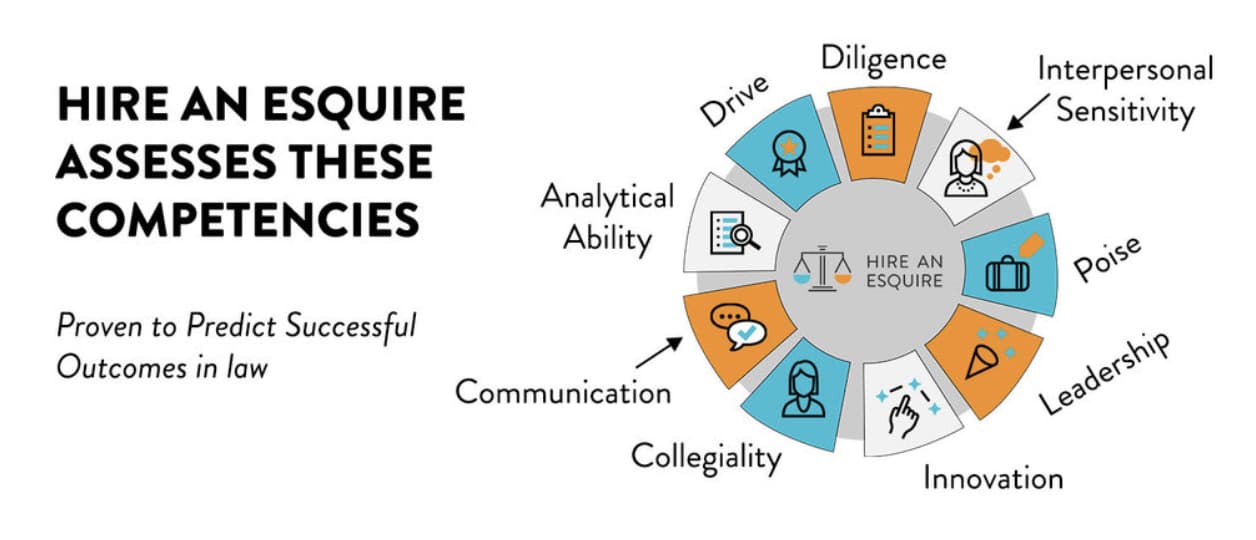Hiring an Attorney? How to Assess Soft Skills for the Best Fit
March 4, 2020
At Hire an Esquire, while we can't manufacture the perfect candidate for your law firm or legal department, we can give you better information so that you can make more informed decisions and take fewer leaps when hiring an attorney.
We've written a lot about soft skills that help attorneys to excel in certain roles and environments and how an attorney's assertiveness, interpersonal sensitivity, and negotiation style can predispose them to success in specific practice areas or what traits make an attorney a great candidate for remote legal work.
But, what soft skills make an attorney generally successful across practice areas and what general soft skills should you look for when hiring an attorney?
At Hire an Esquire, we think understanding this is important because, according to the U.S. Department of Labor, the average cost for each bad hire can equal 30 percent of that individual's annual earnings, this is in addition to the cost of having a potentially toxic worker influence others at the firm and the time spent on interviewing and training. Reducing the number of bad hires has a positive ripple effect throughout your organization.
This is why we approach hiring an attorney in a scientific way, tapping into a vast array of academic resources on employee selection and lawyering effectiveness from the field of Industrial/Organizational Psychology. We have baked in the best practices of the field into our hiring process so that firms can leverage reliable and valid assessments for making their hiring decisions.
Through extensive research, testing, and categorization, we have narrowed down the legal field into 9 easily digestible competencies that are important for success in law. As candidates are onboarded onto our platform and apply for jobs on our platform, we have a multi-step process to assess the competencies that are relevant for legal roles generally and for specific positions. By utilizing this data, our clients are empowered to make the best hiring decisions for their firm or in-house legal department.
Here's an overview of our competency framework and some tips for your own interview and hiring process:

The Hire an Esquire Competency Framework:
Drive: Lawyers with high drive are experts at achieving work objectives with a high amount of energy and are more ambitious than the general population. These individuals are self-disciplined and are more likely to pursue self-development. In a law firm, these attorneys are great at working in a competitive environment as they are very passionate about their careers and job. They are also known to be adept at identifying business opportunities and following through on them. Typically, those with the combination of high achievement orientation, energy, and discipline find themselves on the fast track in previous roles and usually jump up the law firm ladder faster than their peers, making them great candidates for partner positions or business development.
Those with high drive excel in roles where
-
A persistent and disciplined work ethic is required
-
Is able to push self to achieve and exceed goals set
Diligence: Diligence is the hallmark of a person who “does things by the book”. Lawyers who are very diligent are experts at setting objectives, planning, managing time and resources, following directions, and complying with legal obligations. These individuals set high standards for quality and often work very systematically in their office. These attorneys are organized, reliable, and spend a lot of time deliberating on their actions. These qualities make the diligent attorney excellent at fact-finding/legal writing, strategic planning, and managing themselves. Because of the nature of the field of law, this competency is important for any role in the legal realm, but is especially important for regulatory/IP/document review positions.
Diligence: Diligence is the hallmark of a person who “does things by the book”. Lawyers who are very diligent are experts at setting objectives, planning, managing time and resources, following directions, and complying with legal obligations. These individuals set high standards for quality and often work very systematically in their office. These attorneys are organized, reliable, and spend a lot of time deliberating on their actions. These qualities make the diligent attorney excellent at fact-finding/legal writing, strategic planning, and managing themselves. Because of the nature of the field of law, this competency is important for any role in the legal realm, but is especially important for regulatory/IP/document review positions.
Diligence is important for roles which require
-
Organized, careful, and meticulous work habits
-
Dependability, reliability, and rule following behaviors
Poise: Being able to adapt and having stability/stress tolerance is becoming increasingly important in the hectic life of an attorney. Those with high poise are great at adapting, accepting feedback, dealing with ambiguity, and coping with pressure. Because of this skillset, those with high poise are great at advising clients, negotiating high stakes deals, handling criticism, and dealing with critical or stressful events. While this competency on the surface is about keeping your cool, its also one of the strongest indicators of overall work performance and should be considered for every attorney role.
Poise is important feature for roles involving these behaviors
-
Handling pressure and accepting feedback/criticism from clients or coworkers
-
Adapting to stressful situations or being able to diffuse chaotic situations
Analytical ability: This competency has to do with analyzing and evaluating information. Those who are high on these sets of traits love to dig into the details and understand the root causes of problems. They are adept at testing assumptions, making judgments, and demonstrate systems thinking.
Law firms should test for Analytics ability if the job requires
-
The ability to make connections between seemingly unrelated bits of information
-
Looking past what is on the surface and understanding root causes behind an issue
Interpersonal Sensitivity: These individuals are socially savvy and tactful. They take an interest in understanding those who they work with and are quick to sympathize with others. Because of this, attorneys who have high interpersonal sensitivity make great interviewers, are careful listeners, and are excellent at maintaining relationships. They also are adept at advising clients and negotiating. These individuals also do well in team oriented cultures where the end goal is to offer help where it is needed and support others when necessary. This competency is great for client intake positions and many parts of M&A/negotiation roles.
Those with a high degree of interpersonal sensitivity excel in roles where
-
They are tactful and skilled in understanding others in social situations
-
They work well in groups and are a team player for the firm.
Leadership: Attorneys who excel at the leadership competency are proactive, take responsibility for their actions with confidence, and are well suited for making decisions. In groups, those high in leadership tend to naturally take charge and provide direction, delegate work, and motivate others. They are also great at influencing others which makes them excellent at negotiating in a distributive setting. Although it is important to have a natural inclination to take charge and be confident in doing so, it is important that this competency is paired with other important elements such as interpersonal sensitivity to make sure they are not too domineering. Because of their assertiveness and confidence, this competency is great for litigation or trial roles where the lawyer has to make a case.
Test for this competency if the role requires behaviors involving
-
Managing projects and providing direction to colleagues
-
Is a proactive member of the firm and always takes action without being told what to do
Collegiality: The collegial person in the office is the type to bring positivity to those around themselves. They are driven to build rapport with others, network, and manage conflict. Those high in this competency are social creatures by nature and serve best in positions where they can interact with a lot of people. They are the type to share their joy with the rest of the office and are a pleasure to speak with. However, those high in collegiality are less engaged in roles that are limited with human contact. Since these individuals are driven by social interaction, they feel as though they are missing out when it is not there.
Collegiality is important for roles in which
-
The attorney has to interact and network with a wide range of individuals
-
Has a positive attitude and brings a friendly demeanor to the office culture
Innovation: Most of the attorney population is very rule-abiding and like to stick with what they know. However, certain roles require you to think outside of the box and problem solve in new ways. This competency is centered on formulating strategies and concepts, creating and innovating new processes, and learning/researching quickly or on the fly. Those high in innovation are great problem solvers and love to find solutions to old or recurring problems with a novel approach.
Those who are high on the innovation competency tend to
-
Excel at brainstorming new ideas or working with others to finding novel solutions to old or recurring problems
-
Learn quickly and are skilled at researching/understanding new concepts
Communication: Communication is the cornerstone of any client-centered work. This competency is measured best in an interview and it entails speaking articulately, with confidence, and in a meaningful way. Those high in the communication competency excel at oral advocacy, written communication, responsiveness, and listening to others. Those high in this competency do well in positions where they can let their golden tongue do the work such as trials and litigation.
Now you may ask yourself, how do I test for these competencies? Resume reviews, unstructured interviews, and reference checks will tell you very little about them and are generally poor predictors of future performance. At Hire an Esquire, we utilize structured behavioral interviews to tap into how candidates have dealt with relevant situations in their past and work style assessments of personality to understand how candidates function within a work environment. Combining these 2 pieces of evidence with other data about experience matching, we can form a strong predictive model of a successful hire.
Modeling competencies for the roles you are looking for is a great way to predict performance and ensure legal defensibility in your hiring process. Our framework empowers law firms to utilize objective data in their hiring decisions to make the best fit for their firm and reduce bias that envelope typical hiring practices. Ready to start finding the right candidates, faster? Create your free account today!
Schmidt, F. L., & Hunter, J. E. (1998). The validity and utility of selection methods in personnel psychology: Practical and theoretical implications of 85 years of research findings. Psychological bulletin, 124(2), 262.
Shultz, M. M., & Zedeck, S. (2011). Predicting lawyer effectiveness: Broadening the basis for law school admission decisions. Law & Social Inquiry, 36(3), 620-661.